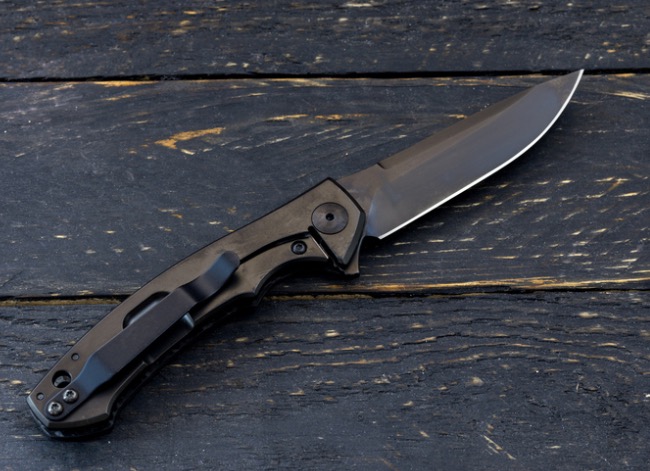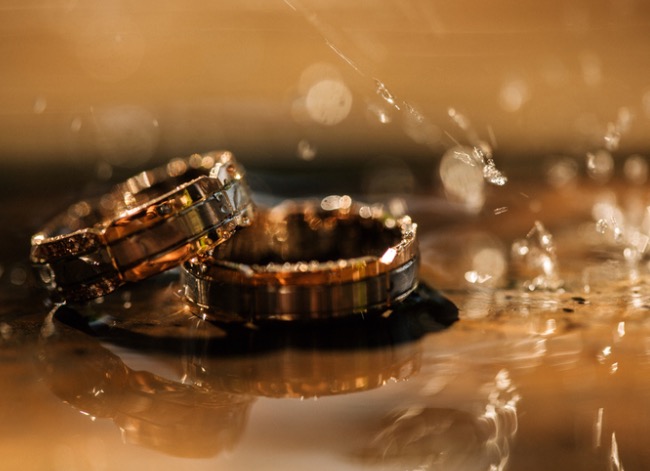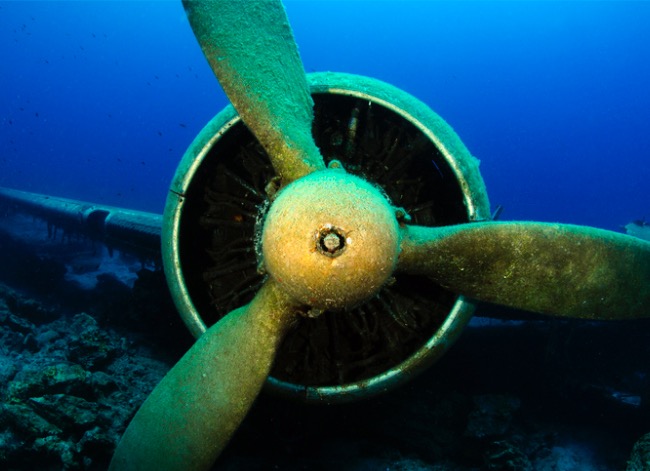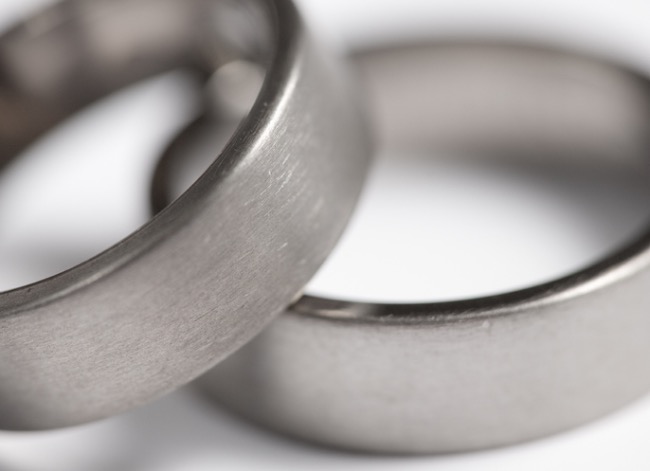We may earn revenue from the products available on this page and participate in affiliate programs. Learn More ›
Q: Is it OK to wear a titanium ring while showering or swimming? Does titanium rust?
A: Titanium is an incredibly useful metal. It’s very tough, strong, light, and has a very high melting point relative to other metals. For these reasons, it’s often used to make jewelry and watches, aeronautical and marine parts, tools, knives, and medical implants such as plates and joint replacements.
The short answer is that pure titanium does not rust like metals containing iron. If something made with titanium does rust, it’s a sure sign that the titanium is mixed with other metals and it is not pure titanium. However, there is more to consider. Keep reading to learn more about titanium and its rust-resistant properties.

Titanium is a highly reactive and resilient metal.
Titanium reacts with oxygen in a variety of ways. For instance, if heated to its combustion point, the fire cannot be extinguished with water. If someone attempts to use water to put a titanium fire out, the fire will burn even more intensely as titanium continues to react with the fresh oxygen in the water. Luckily, this is extremely rare in typical conditions, which you’ll learn more about in a bit.
Titanium also is incredibly resilient. In fact, pure titanium is as strong as steel while also being 45 percent lighter. It’s this strength-to-weight ratio that makes it so perfect for use in airplane components, sports equipment, tools, and other conditions where high strength and low weight matter.
Titanium, after being exposed to the environment, creates a titanium oxide layer that protects the pure titanium beneath.
Remember titanium’s high reactivity with oxygen? Well, something really interesting happens during that reaction. When pure titanium is exposed to oxygen (whether through air or water, and absent excessive heat), oxidation occurs. But, this oxidation does not end in rust and corrosion.
The reaction that occurs between titanium and oxygen is a different animal. Instead of rust (iron oxide), the reaction with oxygen creates titanium oxide. This type of oxide lays atop the pure titanium as a thin, invisible, and protective film. It’s this film that gives titanium its anti-corrosion properties, as it protects the pure titanium underneath from contacting iron oxide, salt, and other conditions that might cause rust.
RELATED: The Best Hammers, Tested and Reviewed

The pure titanium material is resistant to corrosion, unless in an environment without oxygen.
Titanium is reliant on the presence of oxygen to form titanium oxide. The thin layer of titanium oxide formed around the outside of pure titanium is the key to its corrosion resistance. Without that film, titanium can corrode just like a typical corrosive metal.
Oxygen in the atmosphere or water will do — even saltwater works. But, if titanium is in an environment devoid of oxygen, like in a man-made vacuum or even outer space, the reaction cannot occur. This means that the pure titanium would be susceptible to typical oxidation, acids, chemicals, corrosion, and rust.
Titanium alloy, though highly rust-resistant, is more susceptible to corrosion than pure titanium.
Pure titanium in a typical setting is entirely corrosion and rust resistant, but it’s somewhat rare to find pure titanium in consumer goods. You’re more likely to find titanium alloys, which are a mixture of titanium and other metals. Although the mixes can be rust-resistant, they’re not as resistant as pure titanium.
Manufacturers combine metals to make the manufacturing processes less expensive and to blend the best attributes of different metals. These alloys typically contain aluminum, vanadium, and chromium, all of which are relatively rust-resistant. But they also frequently contain iron, which is not rust or corrosion resistant at all.
While the titanium helps to boost the iron’s rust resistance, the resulting relationship also reduces the titanium’s resistance. If a titanium product does rust, it’s a sure sign that it’s not pure.
RELATED: The Best Drill Bits for Metal, Tested
Titanium can stay in sea water for 100 years without corrosion due to the highly active bond between titanium and oxygen.
Pure titanium just needs oxygen to protect itself. And it doesn’t matter how it gets it.
While we may think of seawater as highly corrosive due to its high salinity content, it has very little effect on titanium. That’s because, despite seawater’s best efforts, it’s full of oxygen. That oxygen constantly reacts with the titanium to create the protective forcefield known as titanium oxide.
Many marine parts are made from titanium, including engine parts and propellers (almost exclusively). When divers inspect shipwrecks in oceans, it’s often these parts that display the least amount of change from their condition before the ship sank.



